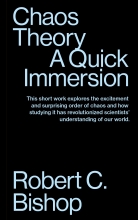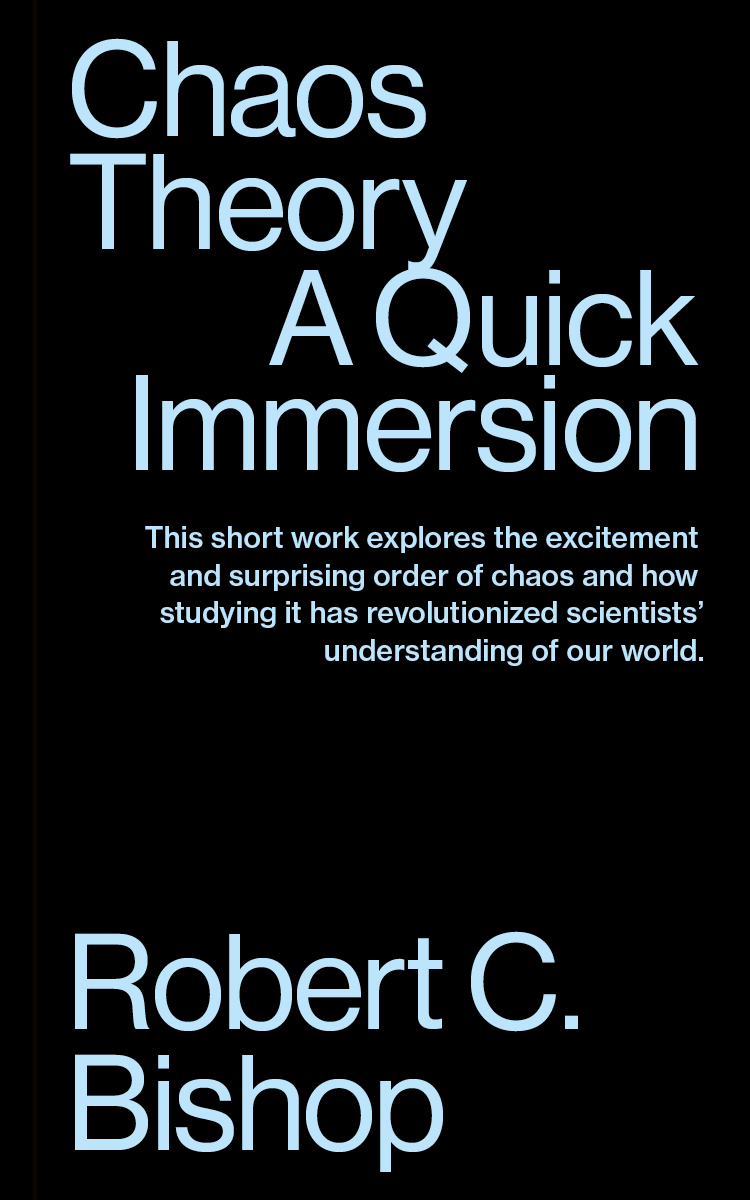

Chaos Theory
A Quick Immersion
Library of Congress Control Number: 2023939935
“Books on chaos theory tend to fall one of two ways. The first are those that cannot resist the hype. The exotic sound of “chaos,” like “artificial intelligence,” invites authors to lean into its mysteries. The second group of books is overly technical and beyond the reach of most readers. Physicists and mathematicians especially find it hard not to include all sorts of arcane detail. This book avoids both pitfalls. Robert Bishop deftly takes the reader through each of the key topics raised by chaos, including its historical roots, and shows why so many disciplines take note. Mathematicians provide fractal geometry as a tool. Computer scientists reveal how chaos puts limits on numerical simulations. Physical scientists have discovered that chaos is ubiquitous in nature. And philosophers explore its implications for a range of longstanding questions. With one foot in physics and another in the philosophy of science, Bishop illustrates each using minimal mathematics with important technical terms explained throughout. There is no better introduction to the topic available and no scholar better suited to the task.” Jeffrey Koperski, Professor of Philosophy, Saginaw Valley State University
“Sensitivity to initial conditions and path dependence, nonlinearities, strange attractors, and fractals…Bishop explains – in enviably clear language -- the surprising properties and emergence of chaotic dynamics in mathematical models and real-world systems, and the differences between the two. The last chapter, on the limits chaos places on knowledge and predictability, provides insights on how individuals as well as scientists can work within those limits while at the same time embracing the remarkable wisdom they offer. Highly recommended.” Alicia Juarrero, author of Context Changes Everything: How Constraints Create Coherence (MIT Press)
“It won't come as a surprise to anyone who has been following Professor Bishop's work over the years on this topic that this book represents the best primer on chaos theory and nonlinear dynamics in existence today.” Michael Silberstein, Professor of Philosophy, Elizabethtown
“Chaos Theory: A Quick Immersion is a clear and engaging introduction to chaos theory. Assuming no prior knowledge, and using helpful analogies and examples from everyday life, it familiarizes readers with key concepts and findings of this fascinating field. The discussion is readily accessible to those new to the topic, yet without skirting over important nuances. In addition to surveying conceptual foundations, Chaos Theory nicely illustrates how ideas and tools from the mathematical study of chaos have been applied in science – in weather forecasting, ecology, physiology, physics, and more. Along the way, it calls attention to oft-overlooked challenges involved in relating mathematical and computer models to the physical world and emphasizes the importance of recognizing and navigating limits when seeking knowledge. This delightful little book will be useful to a wide range of readers interested in understanding what chaos theory is and how its insights can make a difference in science.“ Wendy Parker, Professor of Philosophy, Virginia Polytechnic
Since the 1980s chaos has been the subject of great interest both in scientific research and in public consciousness. Chaos as played roles in books and movies such as Jurassic Park and Bellwether and has been the subject of numerous popularizations. But what is chaos—better characterized as chaotic dynamics—really? How much of an impact does it have on everyday life? This book explores these questions and more, introducing you to the basics of chaos as mathematicians and scientists study it and apply it. There are a lot of buzzwords surrounding chaotic dynamics such as “butterfly effect” and “strange attractors,” and much discussion about whether chaos has shattered scientific dreams of a predictable world. This book will help you understand these buzzwords and their excitement, what limitations there are for predictability, and the wisdom scientists have learned from studying chaos. You will come away with a deeper appreciation of the intricacy and surprising order of our world.

Robert C. Bishop is Professor of Physics and Philosophy and the John and Madeleine McIntyre Endowed Professor of Philosophy and History of Science at Wheaton College. His research focuses on History and philosophy of physics and the social sciences and free will, with special attention to emergence, determinism, chaos, and complexity. He is the author of The Philosophy of the Social Sciences (Continuum 2007), The Physics of Emergence (Institute of Physics 2019), and co-author of Understanding Scientific Theories of Origins: Cosmology, Geology and Biology in Christian Perspective (InterVarsity Press, 2019), and Emergence in Context: A Science-First Approach to Metaphysics (Oxford University Press, 2022).

